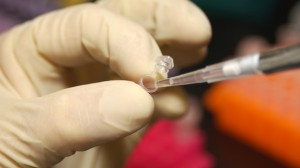NEW YORK (Reuters Health) – Neoadjuvant treatment with erlotinib (Tarceva), an epidermal growth factor receptor (EGFR) inhibitor, can help downstage bladder cancer to organ-confined disease, thereby increasing the chances of a surgical cure, according to study findings presented Tuesday at the 2009 Clinical Congress of the American College of Surgeons in Chicago.
“Current statistics reveal that 50% of patients have organ-confined disease at time of cystectomy, compared to 75% in patients who have taken erlotinib in our pilot study,” lead author Dr. Angela B. Smith, from the University of North Carolina, Chapel Hill, told Reuters Health.
“However,” she noted, “these preliminary results must be confirmed in a larger, randomized study, and we look forward to assessing whether the medication improves survival.”
Dr. Smith reported on 20 patients who received neoadjuvant erlotinib followed by radical cystectomy. Surgical pathology showed pT0 disease in 6 patients, </= pT2 in 9, pT3/4 in 4, and pT0N1 in 1. Thus, the rates of pT0, organ-confined, and lymph-node positive disease were 30%, 75%, and 5%, respectively. At a median of 12 months, two patients have recurrent disease and one has died from myocardial infarction. Erlotinib was generally well tolerated and side effects were minimal. Eleven patients developed a rash and one patient had diarrhea. All subjects with pT0 disease developed a rash, and 10 of the 11 patients with a rash had organ-confined disease. This is consistent with findings in lung cancer patients showing improved disease-specific survival when a rash develops. Genetic analysis showed lower expression of HRas, p85, and FGFR3 in subjects with pT0 disease, “suggesting that these pathways may play a role in cellular survival beyond typical EGFR pathways,” the authors note. “Correlative studies are currently underway to establish which patients (based on their gene expression) will benefit most from erlotinib’s mechanism of action,” Dr. Smith said.




